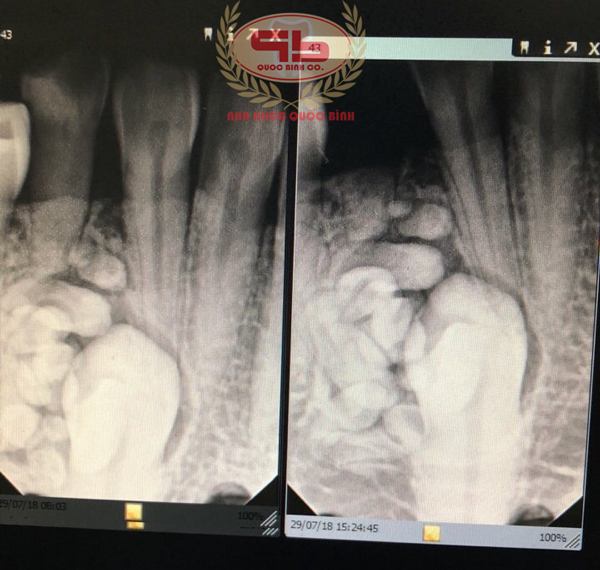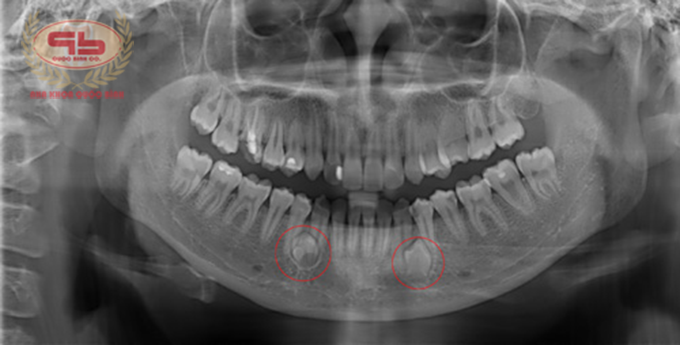Cysts of the teeth are not a rare disease, but it is worth mentioning that the patient is unaware of the severity of the disease. In many situations, both the physician and the patient discover the disease on an occasional accidental X-ray examination, or in before the orthodontic treatment.
So, how is dangerous of the cysts of the teeth disease, let’s learn together:
Cysts of the teeth are the dental follicles located inside the jawbone, which are involved in the underground teeth or surplus teeth. Cyst cover the whole or only part of the tooth, and the inside is a fluid consisting of pus by infection.
It can cause tooth loss in series, causing facial deformities, obstruct eating function, and say.
In some medical literature, the cause of the disease may be due to disorders in the development and formation of teeth.
There are two popular types:
- Out-of the pouch: When infection occurs in the pedicle, it stimulates the formation of follicles surrounding the germ of tooth underneath.
- In the pouch: As the tooth itself has abnormalities on the enamel surface, causing accumulation of fluid.
How do you know if you have cysts of the teeth?
At the time of small dental cyst, only visible to the naked eye can’t detect the disease. In some situations, the patient suffers from permanent defects; The teeth are tilted or rotated or need to be examined for orthodontic treatment. Patients will be screened for X-rays and accidentally discovered the cysts of the teeth.
If the cysts of the teeth have developed larger, the following will occur:
- Loose teeth
- The jaw bone is inflated, will have a painless or painful phenomenon due to superinfection complications.
- If the cysts of the teeth in the lower jaw develop, it can cause numbness lips, due to compression into the lower neural tube.
- In children, the phenomenon of milk teeth do not change, although on the time to replace the permanent teeth.
When X-rays are taken, the imaging of the cysts of the teeth in the jawbone is clearly visible.

What to do when a patient have the cysts of the teeth?
Depending on the purpose of treatment, the surgeon performs surgical procedures to remove the dental cyst, and the underground-teeth from the jaw bone.
I.N.B.O.X/ G.Ọ.I để được tư vấn – RĂNG NGẦM TRONG XƯƠNG HÀM
⛔R.Ă.N.G MỌC NGẦM, CHUYỆN KHÔNG CỦA RIÊNG AI✔️Nhiều người trong các #bệnh_nhân đến phòng khám nha khoa để xử lý các cơn đau, #sưng_răng bất thường.✔️Và trong số bệnh nhân đấy, có người không những có #răng_ngầm mà chiếc r.ă.n.g ấy còn gây viêm nhiễm trong xương hàm. Đây là điều hết sức nguy hiểm.?Chúng ta cùng chứng kiến 1 case xử lý #Răng tiền cối thừa, mọc ngầm trong xương hàm dưới và gây ra hố viêm phát triển khá lớn.☘️Thực hiện: Bs. Khaled Asaad? Biên dựng và xử lý hình ảnh: Nha Khoa Quốc Bình Vũng Tàu—–???—–?Mọi thông tin cần tư vấn, vui lòng:↪️I.N.B.O.X/ Gọi cho ☎️ Hotline 0914 83 99 66—–???—–NHA KHOA QUỐC BÌNH VŨNG TÀUBs chính: BS PHAN QUỐC BÌNH19 Phạm Hồng Thái, P.7, T. Vũng Tàu.28 Lê Lợi, P.4, Tp. Vũng Tàu.www.nhakhoaquocbinh.com
Người đăng: Nha Khoa Quốc Bình Vũng Tàu vào Thứ Bảy, 4 Tháng 8, 2018
In cases of large follicles, destruction of the jaw bone, can cause fractures if not treated in time.
If treated early, treatment is correct, the patient will not relapse after cystic and underground teeth surgery.
Therefore, the advice of dental professionals always remind you periodical dental examinations to detect subterranean teeth or cysts of the teeth for timely treatment.
Contact information for free check-up and consultation:
QUOC BINH DENTAL CLINIC
19 Pham Hong Thai Str., Ward 7, Vung Tau City.
28 Le Loi Str., Ward 4, Vung Tau City.
Hotline: 0914 83 99 66
Page online: https://www.facebook.com/nhakhoaquocbinh/

